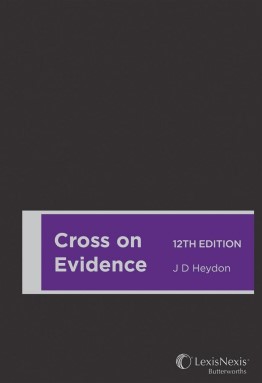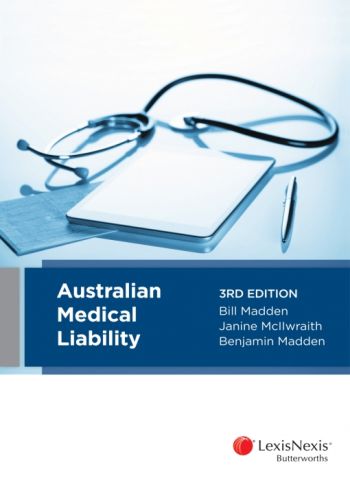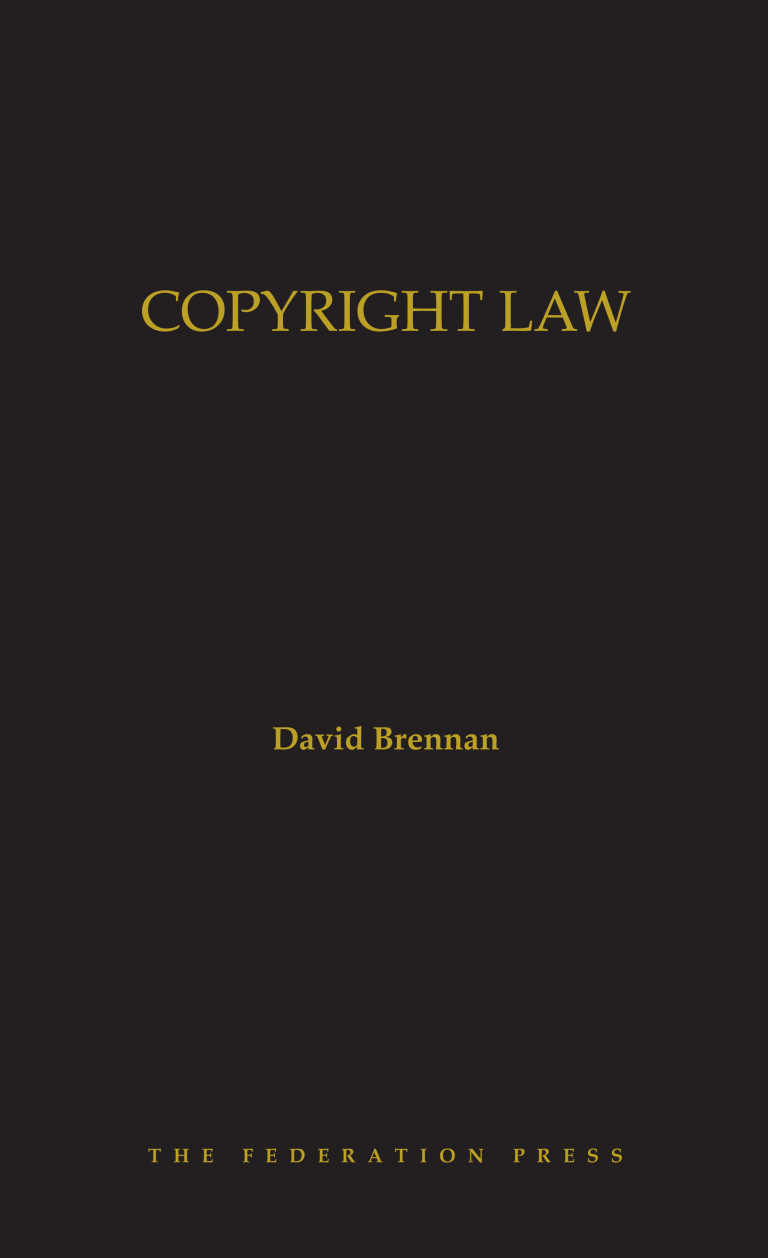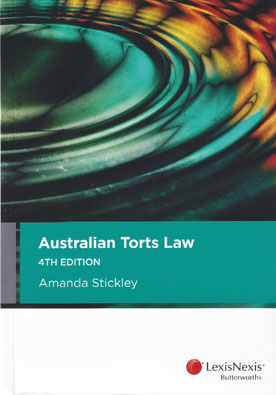Home
Welcome!
This guide provides information about researching Australian law, including books, subscription databases, and internet resources. To learn more about starting research in a foreign law jurisdiction visit our instructional video:
Legal Structure
Australia has three branches of government: executive, legislative and judiciary, with a separation of powers doctrine. Under the Australian Constitution, all Ministers (department heads in the Executive Branch) must be Members of Parliament (the legislative branch).
Parliament can make laws only if given the power by the Constitution. However, if Commonwealth law does cover an area where there is also a state law, the state law is invalid where inconsistent. English common law applies in matters not covered by either Australian or state law. Some pre-1901 British laws remain in effect in the country today.
States & Territories
The Commonwealth of Australia consists of six states and two major territories. These are often referred to by abbreviations, as follows:
- Australian Capital Territory (ACT)
- New South Wales (NSW)
- Northern Territory (NT)
- Queensland (Qld)
- South Australia (SA)
- Tasmania (Tas)
- Victoria (Vic)
- Western Australia (WA)
Minor territories include the Norfolk Islands (NF) plus seven other territories in the Indian Ocean, South Pacific Ocean and Antarctica. The ACT, Northern Territory, and Norfolk Islands are self-governing and have their own courts. The other territories are non-self-governing.
Colonial Legal History
The Commonwealth of Australia came into existence on 1 January 1901, created from six formerly separate British colonies.
Federation meant that the six colonies (called states after Federation) surrendered some powers to form a central government to deal with national issues. Each state maintained its own identity, including a constitution, laws, courts, etc. The legal system applicable to each also differs.
Until the 1980s, the British Parliament and courts still maintained some jurisdiction over Australia.
Secondary Sources
Legal Dictionaries & Encyclopedia
LexisNexis Concise Australian Legal Dictionary by
ISBN: 9780409352917Publication Date: 20202021 edition available in print at KU26 .L49 2021.
Materials by Subject
Legal System Generally
Legal Culture, Legality and the Determination of the Grounds of Judicial Review of Administrative Action in England and Australia by
ISBN: 9789811612671Publication Date: 2021A Legal History for Australia by
Call Number: GEN KU120 .M35 2021ISBN: 9781509939572Publication Date: 2021
Legal Research
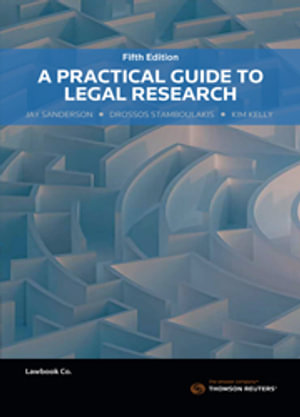 A Practical Guide to Legal Research 5th Edition by Call Number: GEN KU47 .S36 2021ISBN: 9780455244518Publication Date: 2021
A Practical Guide to Legal Research 5th Edition by Call Number: GEN KU47 .S36 2021ISBN: 9780455244518Publication Date: 2021Researching and Writing in Law by
Call Number: K85 .H87 2018ISBN: 9780455237800Publication Date: 2018
Administrative Law
Douglas and Jones's Administrative Law by
Call Number: KU2450 .D68 2018ISBN: 9781760021733Publication Date: 2018The Foundations of Australian Public Law by
Call Number: KU1710 .C66 2017ISBN: 9781107679795Publication Date: 2017
Banking Law
Everett & McCracken’s Banking & Financial Institutions Law by
Call Number: GEN KU885 .E84 2017ISBN: 9780455240176Publication Date: 2017
Bankruptcy Law
Keay's Insolvency: Personal and Corporate Law and Practice by
Call Number: KU964 .K43 2018ISBN: 9780455239811Publication Date: 20182016 edition available in print at KU964 .K43 2016. Australian Bankruptcy Law and Practice by Call Number: KU964 .M42ISBN: 990130788860203941Publication Date: 1996-
Australian Bankruptcy Law and Practice by Call Number: KU964 .M42ISBN: 990130788860203941Publication Date: 1996-
Civil Procedure
 Special Leave to Appeal by Call Number: GEN KU3466 .O27 2021ISBN: 9781760023249Publication Date: 2021
Special Leave to Appeal by Call Number: GEN KU3466 .O27 2021ISBN: 9781760023249Publication Date: 2021Authority to Decide: the Law of Jurisdiction in Australia by
Call Number: KU3583 .L44 2020ISBN: 9781760022075Publication Date: 2020Cowen and Zines's Federal Jurisdiction in Australia by
Call Number: KU3450.5 .L56 2016ISBN: 9781760020682Publication Date: 2016
Commercial & Corporate Law
Commercial Law
 Australian Commercial Law by Call Number: GEN KU856 .T87 2019ISBN: 9780455241395Publication Date: 2019
Australian Commercial Law by Call Number: GEN KU856 .T87 2019ISBN: 9780455241395Publication Date: 2019Commercial Contract Clauses: Principles and Interpretation by
Call Number: KU856 .T56 2019ISBN: 9780455501499Publication Date: 2019 Unconscionable Conduct in Australian Consumer and Commercial Contracts by Call Number: GEN KU982.3 .S337 2018ISBN: 9780409343557Publication Date: 2018
Unconscionable Conduct in Australian Consumer and Commercial Contracts by Call Number: GEN KU982.3 .S337 2018ISBN: 9780409343557Publication Date: 2018
Corporate Law
Conflict of Laws
Nygh's Conflict of Laws in Australia by
Call Number: KU480 .D38 2020ISBN: 9780409349214Publication Date: 2020Private International Law in Australia by
Call Number: KU480 .M67 2019ISBN: 9780409348279Publication Date: 2019
Constitutional Law
 Proportionality in Australian Constitutional Law by Call Number: KU1750 .C46 2020ISBN: 9781760022426Publication Date: 2020
Proportionality in Australian Constitutional Law by Call Number: KU1750 .C46 2020ISBN: 9781760022426Publication Date: 2020 Federal Constitutional Law: a Contemporary View by Call Number: KU1750 .C37 2019ISBN: 9780455241449Publication Date: 2019
Federal Constitutional Law: a Contemporary View by Call Number: KU1750 .C37 2019ISBN: 9780455241449Publication Date: 2019
Contract Law
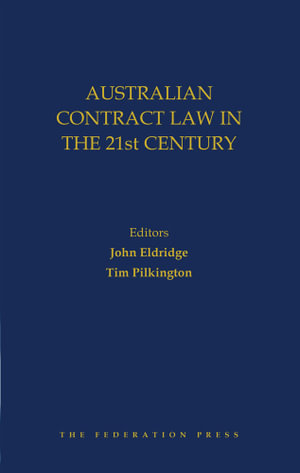 Australian Contract Law in the 21st Century by Call Number: KU810 .A97 2021ISBN: 9781760022532Publication Date: 2021
Australian Contract Law in the 21st Century by Call Number: KU810 .A97 2021ISBN: 9781760022532Publication Date: 2021 Heydon on Contract: the General Part by Call Number: KU810 .H49 2019ISBN: 9780455500201Publication Date: 2019
Heydon on Contract: the General Part by Call Number: KU810 .H49 2019ISBN: 9780455500201Publication Date: 2019Carter's Breach of Contract by
Call Number: KU848 .C372 2019ISBN: 9781509928248Publication Date: 2018
Criminal Law
Sexual Violence in Australia, 1970S-1980S: Rape and Child Sexual Abuse by
ISBN: 9783030733100Publication Date: 2021Principles of Federal Criminal Law by
Call Number: KU3878 .O34 2019ISBN: 9780455501093Publication Date: 2019Modern Criminal Law of Australia by
Call Number: KU3800 .G37 2017ISBN: 9781107565975Publication Date: 2017
Employment Law
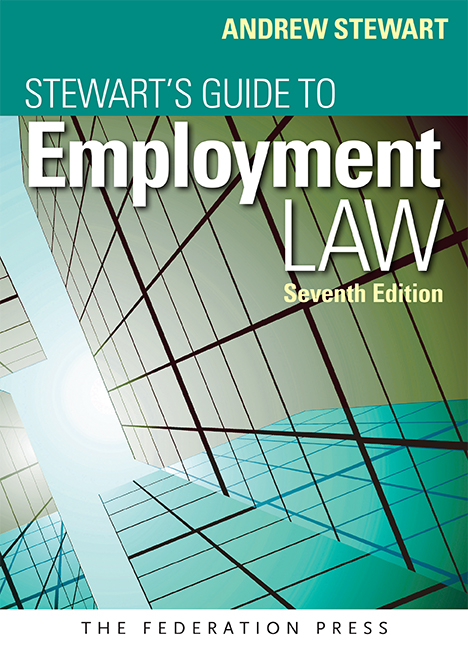 Stewart's Guide to Employment Law by Call Number: GEN KU1220 .S74 2021ISBN: 9781760023157Publication Date: 2021
Stewart's Guide to Employment Law by Call Number: GEN KU1220 .S74 2021ISBN: 9781760023157Publication Date: 2021 The Contract of Employment by Call Number: GEN KU1229 .I78 2019ISBN: 9780409351088Publication Date: 2019
The Contract of Employment by Call Number: GEN KU1229 .I78 2019ISBN: 9780409351088Publication Date: 2019Inventing Unemployment: Regulating Joblessness in Twentieth-Century Australia by
Call Number: KU1208 .O36 2019ISBN: 9781509928224Publication Date: 2019General Protections Under the Fair Work Act by
Call Number: KU1214.52009 .D66 2019ISBN: 9780409348682Publication Date: 2019The Evolving Project of Labour Law: Foundations, Development and Future Research Directions by
Call Number: KU1220 .E96 2017ISBN: 9781760021313Publication Date: 2017Regulation Theory and Australian Capitalism by
Call Number: KU1224 .H45 2017ISBN: 9781786603555Publication Date: 2017
Environmental Law
Environmental law in Australia by
Call Number: KU1507 .B37 2019ISBN: 9780409349115Publication Date: 2019Safety, Security, Health and Environment Law by
Call Number: KU1390 .T66 2019ISBN: 9781862879768Publication Date: 2019
Evidence
 Australian Uniform Evidence Law: Principles and Context by Call Number: KU3542 .B45 2019ISBN: 9780409345674Publication Date: 2019
Australian Uniform Evidence Law: Principles and Context by Call Number: KU3542 .B45 2019ISBN: 9780409345674Publication Date: 2019
Family Law
 Children and the Law in Australia by Call Number: KU517 .C478 2017ISBN: 9780409342024Publication Date: 2017
Children and the Law in Australia by Call Number: KU517 .C478 2017ISBN: 9780409342024Publication Date: 2017 Australian Master Family Law Guide by Call Number: KU540 .A97 2016xISBN: 9781925397116Publication Date: 2016
Australian Master Family Law Guide by Call Number: KU540 .A97 2016xISBN: 9781925397116Publication Date: 2016
Health Law
 Pandemics, Public Health Emergencies and Government Powers: perspectives on Australian Law by Call Number: GEN KU1493 .P36 2021ISBN: 9781760022969Publication Date: 2021
Pandemics, Public Health Emergencies and Government Powers: perspectives on Australian Law by Call Number: GEN KU1493 .P36 2021ISBN: 9781760022969Publication Date: 2021Disability, Rights and Law Reform in Australia by
Call Number: K12 .A936344 v.35, no. 2ISBN: 9781760021603Publication Date: 2017
Indigenous Peoples
Indigenous Aspirations and Structural Reform in Australia by
ISBN: 9781509940172Publication Date: 2021Truth-Telling: History, Sovereignty and the Uluru Statement by
Call Number: DU124.C48R49 2021ISBN: 9781742245119Publication Date: 2021Aboriginal and Torres Strait Islander Legal Relations by
Call Number: KU519.I64 B44 2019ISBN: 9780190310035Publication Date: 2019Indigenous People and Criminal Justice by
Call Number: KU519.I64 I53 2019ISBN: 9781925339901Publication Date: 2019The Struggle for Aboriginal Rights by
Call Number: GN666 .S77x 1999ISBN: 9781864485844Publication Date: 1998A unique record of the voices of Black Australia.
Insurance Law
Australian Insurance Law: A First Reference by
Call Number: KU931.P96 2015ISBN: 9780409337525Publication Date: 2015
Intellectual Property
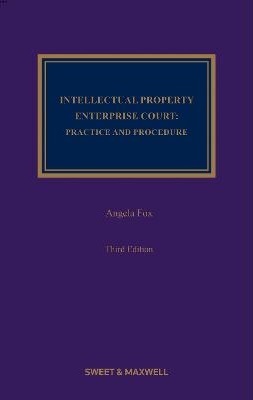 The Intellectual Property Enterprise Court: Practice and Procedure by Call Number: GEN KD1275 .F69 2021ISBN: 9780414080935Publication Date: 2021
The Intellectual Property Enterprise Court: Practice and Procedure by Call Number: GEN KD1275 .F69 2021ISBN: 9780414080935Publication Date: 2021Australian Intellectual Property Law by
Call Number: KU1100 .D38 2020ISBN: 9781108746953Publication Date: 2020Commercialisation of Intellectual Property by
Call Number: KU1100 .S78 2019ISBN: 9780409340648Publication Date: 2019
Property Law
 The Law Affecting Valuation of Land in Australia by Call Number: KU658 .H93 2020ISBN: 9781760022334Publication Date: 2020
The Law Affecting Valuation of Land in Australia by Call Number: KU658 .H93 2020ISBN: 9781760022334Publication Date: 2020An Introduction to Property Law in Australia by
Call Number: KU640 .C48 2019ISBN: 9780455241173Publication Date: 2019 Legal and Equitable Property Rights by Call Number: KU640 .T37 2019ISBN: 9781760022044Publication Date: 2019
Legal and Equitable Property Rights by Call Number: KU640 .T37 2019ISBN: 9781760022044Publication Date: 2019
Statutory Law
 The Coherence of Statutory Interpretation by Call Number: KU451 .C64 2019ISBN: 9781760022099Publication Date: 2019
The Coherence of Statutory Interpretation by Call Number: KU451 .C64 2019ISBN: 9781760022099Publication Date: 2019Interpretation Acts: Origins and Meaning by
Call Number: KU451 .J33 2019ISBN: 9780455500607Publication Date: 2019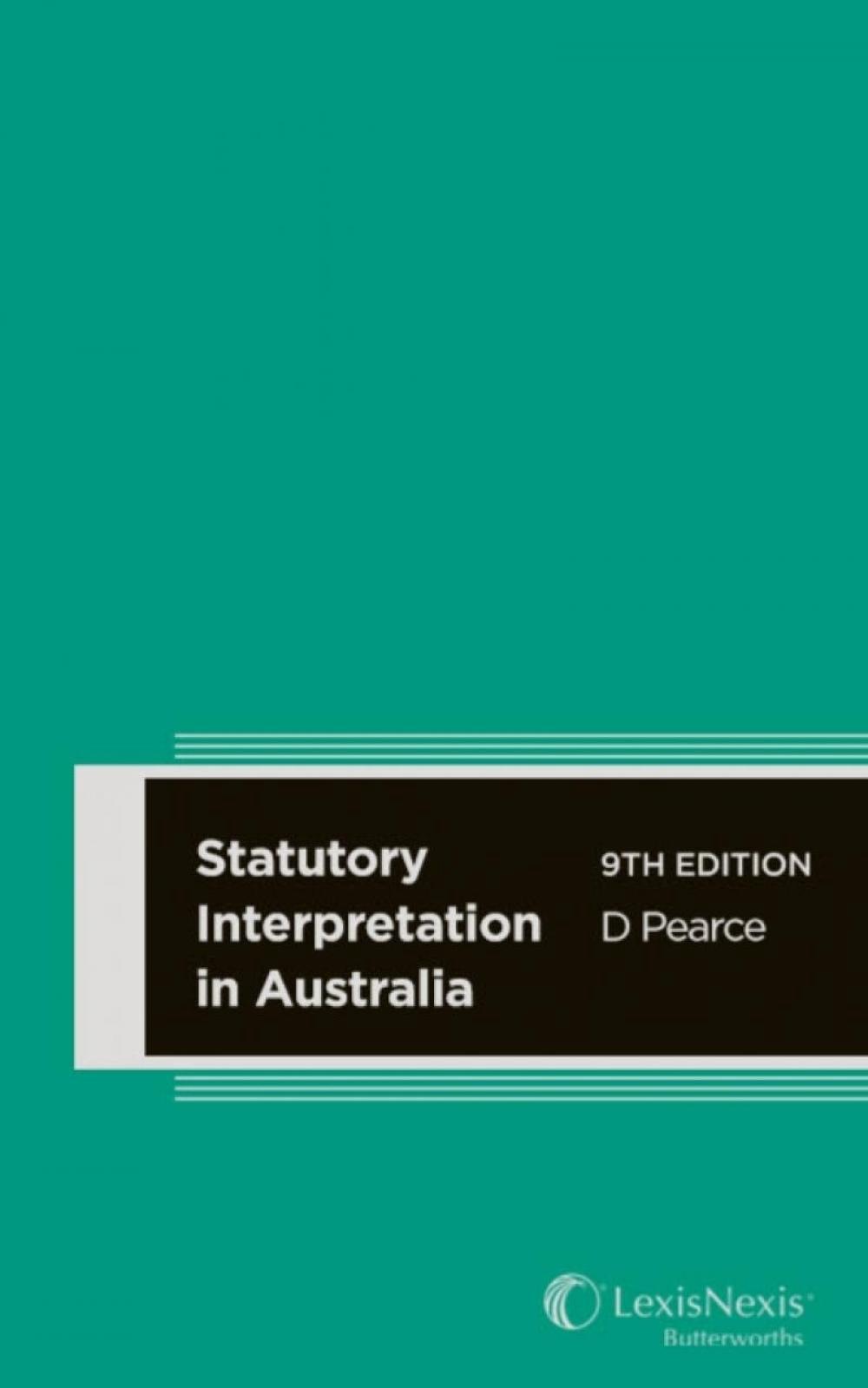 Statutory Interpretation in Australia by Call Number: KU451 .P43 2019ISBN: 9780409350562Publication Date: 2019
Statutory Interpretation in Australia by Call Number: KU451 .P43 2019ISBN: 9780409350562Publication Date: 2019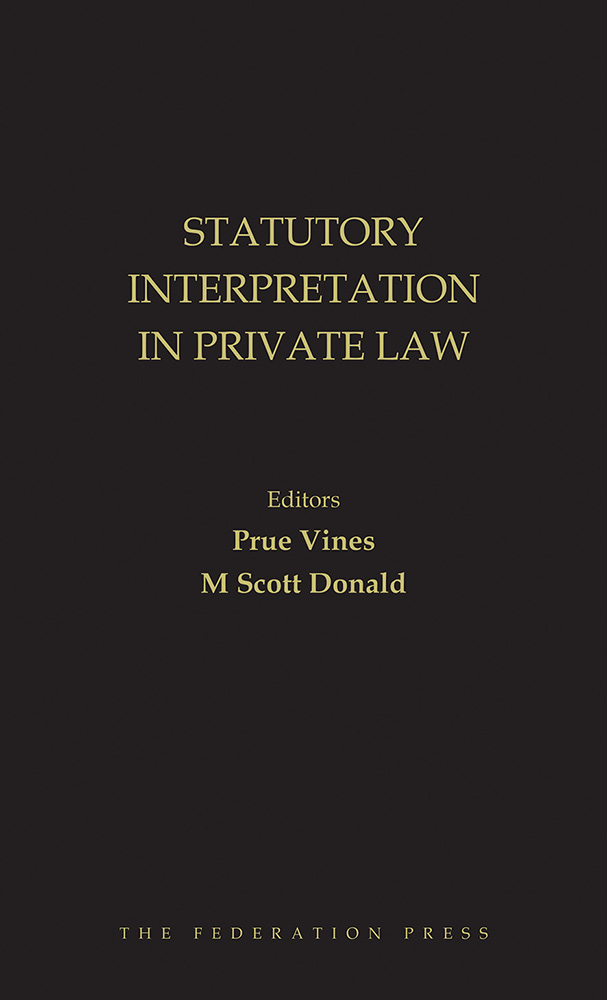 Statutory Interpretation in Private Law by Call Number: KU479 .S73 2019ISBN: 9781760022051Publication Date: 2019
Statutory Interpretation in Private Law by Call Number: KU479 .S73 2019ISBN: 9781760022051Publication Date: 2019Public Law and Statutory Interpretation: Principles and Practice by
Call Number: KU1710 .C73 2017ISBN: 9781760021528Publication Date: 2017
Sports & Entertainment Law
Tax Law
The Artful Aussie Tax Dodger by
Call Number: KU2790 .F85 2017ISBN: 9783838210544Publication Date: 2017Insurance in European VAT by
Call Number: K4487.I57 P37 2017ISBN: 9789041183606Publication Date: 2016Land Tax in Australia: Fiscal Reform of Sub-National Government by
Call Number: KU2830.L36 M36 2016ISBN: 990146219080203941Publication Date: 2016
Tort Law
Australian Principles of Tort Law by
Call Number: KU940 .S74 2017ISBN: 9781760021382Publication Date: 2017A History of Australian Tort Law 1901-1945 by
Call Number: KU940 .L86 2018ISBN: 9781108423311Publication Date: 2017Professional Liability in Australia by
Call Number: KU946 .W35 2016ISBN: 9780455230801Publication Date: 2016
Wills, Trusts, & Estate
Principles of Equity and Trusts by
Call Number: KU490 .H47 2020ISBN: 9781760022495Publication Date: 2020Equity and Trusts in Australia by
Call Number: KU490 .D35 2019ISBN: 9780455241722Publication Date: 2019
Journals & Articles
A list of Australia Law Journals is freely available on worldlii.org.
Full Text Law Reviews & Journals
Indicies to Legal Scholarship
- Index to Legal Periodicals and BooksIncludes over 1,025 English language legal journals, law reviews, yearbooks, institutes, statutes, bar association publications, university publications, and government publications. It covers U.S., Canada, Great Britain, Ireland, Australia and New Zealand.
- LegalTracProvides citations to articles from law reviews, bar association journals, legal newspapers, international legal journals, and law-related business and general interest articles. It includes the U.S., Australia, Canada, Ireland, New Zealand and the United Kingdom. Also available through Westlaw (password required).
- Legal Journals IndexContains citations to and abstracts of articles in over 450 legal journals published in the United Kingdom and other European countries. Focuses on topics pertaining to the laws of the European Union and its member states.
Constitution
Constitution
The Commonwealth of Australia Constitution Act (1900), by the British Parliament, established the Australian Constitution. The Library of Congress provides information regarding helpful materials on Australian Constitutional Law.
- The Australian ConstitutionFree and open electronic copy of the Australian Constitution from the Parliament of Australia Website.
- Australian Constitution IllustratedThis source includes the current constitution in its original language format, a substantial constitutional history, and resources on constitutional and political developments.
Treaties
Statutes & Legislation
Statutes & Legislation
The national legislature is the Parliament of Australia. The House of Representatives contains 151 members representing the Australia electorates. While, the Senate contains 76 members representing states and territories. The parliament chooses a government based on majority of a single party or a coalition of parties in the House of Representatives. The de facto head of government is the Prime Minister of Australia. On the advice of the Prime Minister, the Queen appoints a Governor-General.
"To make or change a law, a bill must be introduced into the Parliament. Bills are then debated and voted on by members of parliament. To become a law a bill must be agreed to by a majority vote in the House of Representatives and the Senate, and be given Royal Assent by the Governor-General. Laws are also known as an Act of Parliament." Work of the Parliament.
Digital
- Federal Register of Legislation"The Federal Register of Legislation (the Legislation Register) is the authorised whole-of-government website for Commonwealth legislation and related documents. It contains the full text and details of the lifecycle of individual laws and the relationships between them."
The legislative process is outlined the the House of Representative's page on:
Historical Acts of Parliament are available in print at:
British Statutes
"In very general terms, British legislation no longer applies to Australia either federally or at state level." For more detailed information visit:
Case Law
Case Law
The three major courts are the Supreme Court, the High Court and the Court of Appeals. WorldLII.org provides a detailed online listing of courts and court reports. There is also a:
The Australian Law Reports is the official publication for case law.
- Australian Law ReportsCall Number: KU19.A21973
ISBN: 0310-0014
Publication Date: 1973-2012
Indexes and Tables kept in stacks; all other volumes at Harvard Depository.
Online access to cases is available through:
- Australia Cases - AustLIIThis open source case searching option provides access to many federal, state, and territorial case opinions.
Case Validation
- CaseBase - LexisCitator and annotator covering over 100 Pacific and international report series, journals and unreported decisions from all major Australian and New Zealand courts and selected tribunals.
- LawCiteFree Open Source Citator for cases globally, including Australia.
News
News
The context surrounding a legal issue can be an extremely important part of the research process. News sources can help researchers stay up to date and provide an important frame of reference. The National Library of Australia has a helpful Research Guide on:
Current Australian news sources are available through Lexis, Westlaw, and Factiva:
Historical news is available through the following databases:
- Trove Newspaper ArchiveMillions of digitised pages from more than 1,000 Australian newspapers and government gazettes.
Historical Collections
Historical Collections
To learn about more places to find historical legal collections from Australia visit:
Organizations
More Materials
Research Guides
Getting Help
Contact Us!
Ask Us! Submit a question or search our knowledge base.
Chat with us! Chat with a librarian (HLS only)
Email: research@law.harvard.edu
Contact Historical & Special Collections at specialc@law.harvard.edu
Meet with Us Schedule an online consult with a Librarian
Hours Library Hours
Classes View Training Calendar or Request an Insta-Class
CC License
CC License
This guide is licensed under a Creative Commons Attribution-Noncommercial-Share Alike 3.0 United States License.
You may reproduce any part of it for noncommercial purposes as long as credit is included and it is shared in the same manner.

